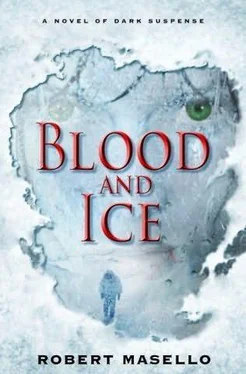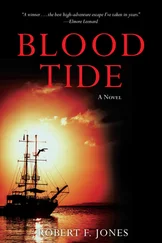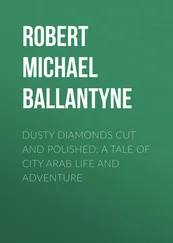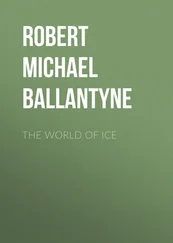Robert Masello - Blood and Ice
Здесь есть возможность читать онлайн «Robert Masello - Blood and Ice» весь текст электронной книги совершенно бесплатно (целиком полную версию без сокращений). В некоторых случаях можно слушать аудио, скачать через торрент в формате fb2 и присутствует краткое содержание. Жанр: Триллер, на английском языке. Описание произведения, (предисловие) а так же отзывы посетителей доступны на портале библиотеки ЛибКат.
- Название:Blood and Ice
- Автор:
- Жанр:
- Год:неизвестен
- ISBN:нет данных
- Рейтинг книги:3 / 5. Голосов: 1
-
Избранное:Добавить в избранное
- Отзывы:
-
Ваша оценка:
- 60
- 1
- 2
- 3
- 4
- 5
Blood and Ice: краткое содержание, описание и аннотация
Предлагаем к чтению аннотацию, описание, краткое содержание или предисловие (зависит от того, что написал сам автор книги «Blood and Ice»). Если вы не нашли необходимую информацию о книге — напишите в комментариях, мы постараемся отыскать её.
Blood and Ice — читать онлайн бесплатно полную книгу (весь текст) целиком
Ниже представлен текст книги, разбитый по страницам. Система сохранения места последней прочитанной страницы, позволяет с удобством читать онлайн бесплатно книгу «Blood and Ice», без необходимости каждый раз заново искать на чём Вы остановились. Поставьте закладку, и сможете в любой момент перейти на страницу, на которой закончили чтение.
Интервал:
Закладка:
The trumpeter stepped up on one of the fence rails, raised the gleaming instrument to his lips, and played, three times in rapid succession, the rousing line that called the cavalry to charge. The horses whinnied and neighed, and Winslow's mare, directly to Sinclair's right, raised his head and forelegs, nearly throwing Winslow off altogether.
Sinclair, like the others, drew his wooden sword in one swift, almost silent motion and raising his right arm straight, shouted, “On!” to Ajax, while nipping at the horse's flanks with the jangling spurs. The horse burst forward like a racer on the Ascot track and the ground thundered as the entire line of cavalry rushed to meet the line coming at them. Somewhere in the opposing force, Le Maitre and Rutherford were riding, but the dun-colored horse coming most directly at Sinclair was ridden by Sergeant Hatch, a superb horseman in his own right and a veteran of the India campaigns. Hatch held the reins down low, a sign of confidence in his ability to control his mount, and his saber was held steadily aloft. He would pass, Sinclair judged, to his left, which meant they would be exchanging blows while pivoting in their saddles.
Sinclair held his legs tight to the sides of the horse as the turf exploded under the horses’ hooves, and now he could even make out Hatch's face-the man was grinning, showing off his white teeth and thick moustache, in a face made permanently tan by years in the Punjab sun. The commanding officers, most of whom had never seen combat, often disdained the “India men”-men who had not been able to purchase higher commissions and who had actually served in the Gwalior Campaign, or fought alongside the Bengal Light Cavalry in battles at Punniar or Ferozeshah-but to Sinclair it was an admirable, and enviable, thing. To have seen combat! To have engaged, and killed, an enemy soldier! What could be grander than that?
Hatch was bearing down on him now-with all the joy of a veteran soldier about to teach a neophyte, in gold braid and cherry-colored trousers, a lesson or two about the manly art of war. He screamed, “Huzzah!” as their horses nearly collided, and his wooden sword whirled in the air. Sinclair's went up to meet it, but the force of the blow made his sword and his arm, too, shudder all the way to the shoulder. The clatter of the wood caused the horses to whinny and buck in fear, but Sinclair was able to keep control of Ajax using the pressure of his own legs and one firm hand on the reins. Hatch's horse bared its teeth, as if it, too, had lessons to teach, and Ajax pulled his head away. Hatch leaned back in his saddle and aimed another blow, this time his blade sliding down the length of Sinclair's sword with a deadly scratching noise, stopping just short of the handle guard.
The horses bumped sides, like rolling battleships, and parted. But Hatch wheeled around behind, and as Sinclair twisted in his seat, the saber flew again; Sinclair ducked and felt the top of his helmet knocked askew. The strap suddenly jerked off his chin, and the hat tumbled down into the melee of hooves. Hatch's horse trotted in front of Ajax, and Hatch himself taunted Sinclair by tapping the tip of his sword on the baldric from which his opponent's empty scabbard hung.
“Dance, my Russian bear,” Hatch said, pretending to treat him like their foreign foe. “Dance!”
But Sinclair was in no mood for jokes, or ridicule. While all around him, other soldiers wheeled and clashed and battled, he touched his spurs to Ajax's left flank, and the horse moved forward; without his helmet on, Sinclair could actually see better, and as Hatch prepared for Sinclair to come to his right, Sinclair tugged on the reins and Ajax immediately altered his course. Sinclair swung his sword, and Hatch had just enough time to fend off the blow. But rather than drawing back, Sinclair struck again, the blow glancing off the edge of Hatch's saber and nearly taking off the man's nose. The dun-colored horse neighed and kicked out. Hatch reared back in his saddle, virtually standing in his stirrups, to get out of reach of another swing, and when Sinclair had passed, he drove his horse headfirst into Ajax's flanks. Before the horse could turn, or Sinclair could right himself in the saddle, Hatch had looped his reins on his pommel and with his hand now free reached out and grabbed Sinclair by the fur collar of his pelisse, dragging him off his horse altogether. Sinclair slid down the horse's flanks, his equipment clanking, his shoulder harness slipping loose, and thumped down onto the broken soil, rolling free as nimbly as he could of the flying hooves all around him. There was dirt in his mouth, and the remnants of his helmet were crushed flat.
The bugler sounded an end to the conflict, and as the combatants separated, some laughing, others licking their imagined wounds, Sinclair looked around; three or four other men were also lying in the dirt, one with a bloody or broken nose, another with a gash in his leg from a caught spur. All looked less than pleased with themselves. As Sinclair struggled onto all fours-his cherry trousers sporting a great hole in one knee-he saw a pair of black boots striding up and saw a gnarled, brown hand extended.
“You can't always expect your enemy to fight fair,” Sergeant Hatch said, helping to lift Sinclair off the ground. He bent down, picked up the black brim of Sinclair's helmet, knocked the dust off it, and ceremoniously handed what was left of it to him. “But that was a fine bit of riding-you held your horse well.”
“Not well enough, apparently.”
Hatch laughed, and though he was probably no more than eight or nine years older than Sinclair, his face folded itself into a thousand tiny brown lines, reminding Sinclair of a parchment map, and making it very hard for Sinclair to hold a grudge.
“We India men,” he said, boldly appropriating what was generally considered a slur, “are so used to fighting scoundrels that we've learned to fight like ‘em.” He paused, and the smile left his face. “Which is why you must, too.”
Sinclair was mildly surprised-he was so unaccustomed to hearing anything but the most high-minded sentiments about warfare, espoused by officers drawn from the aristocracy and whose battle experience was generally nil, that to listen to such advice seemed almost treasonous in itself. War was regarded as a courtly game, played by an elaborate set of rules that all gentlemen adhered to, whatever the cost. But here was this battle-hardened veteran, telling him that it was a struggle with brutes who would just as soon manhandle you off your horse than engage in proper swordplay
As they led their mounts off the field, Sergeant Hatch offered a few more pointers on the most recent theory of equitation, presented by Captain Nolan of the 15th Hussars-”If your horse kicks at the spur, it's a sign your weight is too far forward; if he capers, it means the weight is too much on the haunches”-and they were waiting in file to pass through the gate when a rider, Corporal Cobb, the flanks of his horse streaming with sweat, charged up to the fence, waving a sheaf of papers at the lancers.
“They've come!” he shouted, his horse rearing back on his hind legs. “The orders from the War Office!”
The men stopped in their tracks.
The corporal gained control of his mount, then rising in his saddle to make himself better seen and heard, announced that “By order of Lord Raglan, Commander in Chief of the British Army of the East, the 17th Duke of Cambridge's Own Lancers shall depart on the tenth of August, aboard Her Majesty's Ships Neptune and Henry Wilson, for the port of Constantinople; there, under the supervisory command of Lieutenant-General, Lord Lucan, they shall aid in the taking of Sebastopol.”
There was more to the announcement, and Cobb went on reading, but Sinclair could hear nothing of it over the cheers and hollering of his fellow dragoons. Many of the men threw their helmets into the air, others brandished their wooden swords; several shot off a round on their pistols, frightening the horses. Sinclair, too, felt his blood racing in his veins. This was it, at last! He was going to war. All the drilling, and training, and mucking about in the barracks, was finally going to come to something! He was going to go to the Crimea and help rescue Turkey from the depredations of the Czar. He thought of a cartoon he'd seen in the paper that morning-it showed the British lion in a bobby's hat, tapping the rampaging Russian bear on the shoulder with a nightstick and saying, “Now, now, I shall have no more of that!” He heard himself shouting, too, and saw Frenchie astride the fence, leading a dozen men in a raucous chorus of “Rule, Britannia, Britannia, rule the waves!” He turned to Sergeant Hatch to clap him on the back, but stopped short when he saw his face.
Читать дальшеИнтервал:
Закладка:
Похожие книги на «Blood and Ice»
Представляем Вашему вниманию похожие книги на «Blood and Ice» списком для выбора. Мы отобрали схожую по названию и смыслу литературу в надежде предоставить читателям больше вариантов отыскать новые, интересные, ещё непрочитанные произведения.
Обсуждение, отзывы о книге «Blood and Ice» и просто собственные мнения читателей. Оставьте ваши комментарии, напишите, что Вы думаете о произведении, его смысле или главных героях. Укажите что конкретно понравилось, а что нет, и почему Вы так считаете.












